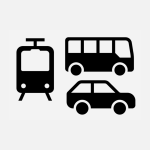WELCOME TO THE RUC GUIDE
The Road Usage Charge Guide offers a collection of road usage charge (RUC) resources, best practices, and sample communications materials—all for your use. This WebResource is designed to provide users with a more interactive way to access National Cooperative Highway Research Program research findings. Please use this resource in a way that works for you. Feel free to download and save any material from this site.
WHAT IS A ROAD USAGE CHARGE?
A RUC allows all users of a transportation system to help pay for that system in a fair manner and in proportion to how much it is used. RUC is also frequently referred to as a mileage-based user fee (MBUF), vehicle miles traveled (VMT) tax, or distance-based fee (DBF). Learn why so many states are exploring RUC as a more sustainable replacement for the fuel tax:
RESOURCES FOR RUC USERS
Are you part of a team that is exploring, setting up, or implementing a RUC program in your state? Click the icons below to see resources tailored to your area of expertise.
Why we’re providing this resource
Around the U.S., many states are exploring a road usage charge (RUC) program as they seek a sustainable alternative to the fuel tax. We created the RUC Guide to provide these states with practical tools for their RUC journeys. Although some of the information in this resource can inform a federal RUC program, it was designed with a focus on state RUC programs. Federal RUC will be explored further in a national study committee and pilot program created in the Infrastructure Investment and Jobs Act (IIJA).
We understand that RUC is not a one-size-fits-all endeavor. To help states choose the path that works for them, our RUC Guide provides a detailed breakdown of the RUC components, the building blocks of activities that support each stage of the RUC components, and the considerations, challenges, and strategies that states need to understand as they move RUC forward. Since the approach to RUC may vary based on vehicle type, strategies have been designed to accommodate passenger vehicles and commercial vehicles differently, while relying on the same building blocks and methodologies.
Since the distinct RUC users play unique roles, we’ve also developed specific resources for lead RUC agencies, policymakers, communications professionals, and transportation professionals.
Whether you’re just starting to study RUC or you’re ready to expand an existing RUC program, you’ll find resources within this guide to help you navigate the road ahead.
An overview of the research that informs the guide
We reviewed RUC programs, pilot programs, and research across the U.S. and around the world to develop resources relevant to each stage of the RUC journey. We also studied the operating contexts of the 50 states and Washington, D.C., to understand which factors inform how a RUC program is implemented.
As part of our research, we’ve identified 9 considerations that can help states figure out how to move RUC forward:
- Clean energy policies
- Existing transportation policies and funding features
- Public awareness and perception of transportation funding needs
- Experience with RUC, if any
- Constitutional and legal spending restrictions
- Tax enactment requirements
- Vehicle inspection requirements
- Geographic features and population distribution
- Agency organizational and revenue structures
You can explore how these considerations might affect RUC in your state by taking the Self-Assessment or by exploring the RUC Stages.
Who will benefit from the guide?
This guide is for anyone who wants to study RUC or move RUC forward in their state. From lead RUC agencies to policymakers, communications professionals to transportation professionals, these RUC users will find insights and tools for building a RUC program.
We’ve researched programs across the U.S. and around the world to gather best practices and insights on RUC programs in all stages of development, from programs that are just starting to explore RUC to those that are fully launched and operable. No matter where your state is on its RUC journey, this guide has resources for you.



